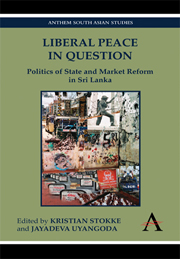Book contents
- Frontmatter
- Contents
- List of Illustrations
- List of Contributors
- 1 Liberal Peace in Question: The Sri Lankan Case
- 2 Travails of State Reform in the Context of Protracted Civil War in Sri Lanka
- 3 Fallacies of the Peace Ownership Approach: Exploring Norwegian Mediation in Sri Lanka
- 4 The Politics of Market Reform at a Time of Ethnic Conflict: Sri Lanka in the Jayewardene Years
- 5 From SIHRN to Post-War North and East: The Limits of the ‘Peace through Development’ Paradigm in Sri Lanka
- 6 Buying Peace? Politics of Reconstruction and the Peace Dividend Argument
- 7 Women's Initiative in Building Peace: The Case of Northern Sri Lanka
- 8 Liberal Peace and Public Opinion
- Notes
- References
3 - Fallacies of the Peace Ownership Approach: Exploring Norwegian Mediation in Sri Lanka
Published online by Cambridge University Press: 05 March 2012
- Frontmatter
- Contents
- List of Illustrations
- List of Contributors
- 1 Liberal Peace in Question: The Sri Lankan Case
- 2 Travails of State Reform in the Context of Protracted Civil War in Sri Lanka
- 3 Fallacies of the Peace Ownership Approach: Exploring Norwegian Mediation in Sri Lanka
- 4 The Politics of Market Reform at a Time of Ethnic Conflict: Sri Lanka in the Jayewardene Years
- 5 From SIHRN to Post-War North and East: The Limits of the ‘Peace through Development’ Paradigm in Sri Lanka
- 6 Buying Peace? Politics of Reconstruction and the Peace Dividend Argument
- 7 Women's Initiative in Building Peace: The Case of Northern Sri Lanka
- 8 Liberal Peace and Public Opinion
- Notes
- References
Summary
Introduction
This study explores Norwegian peace diplomacy in Sri Lanka, during 2002–2006 in the peace process between the Sri Lankan government and the Liberation Tigers of Tamil Eelam (LTTE). The Norwegian mediation attempt is unique in several ways. It represents the first attempt of third-party mediation in Sri Lanka, where the mediator was invited and accepted by both main parties. The 2002 ceasefire agreement also established the longest pause in any major fighting between the LTTE and the government, in the trajectory of the conflict. Moreover, the Norwegians were not only active as facilitators of the negotiation process, they also played a key role in the Sri Lanka Monitoring Mission (SLMM), a mission designed to observe the compliance to the ceasefire agreement. At the same time, the Norwegian mediation process has not been without criticism. The Norwegian mediators have been perceived as being too passive in the approach to human rights abuses committed both by the Sri Lankan government and the rebels. In addition, a large section of the Sri Lankan population, notably within the majority Sinhalese population, have seen Norway as favouring the Tamil cause and being soft on terrorism.
By now there is a growing literature dealing specifically with the different aspects of the Norwegian peace diplomacy in Sri Lanka. Yet, it is not possible to fully understand the Norwegian peace diplomacy without grasping the underlying guiding assumption on which it has been built.
- Type
- Chapter
- Information
- Liberal Peace in QuestionPolitics of State and Market Reform in Sri Lanka, pp. 63 - 76Publisher: Anthem PressPrint publication year: 2011
- 1
- Cited by



